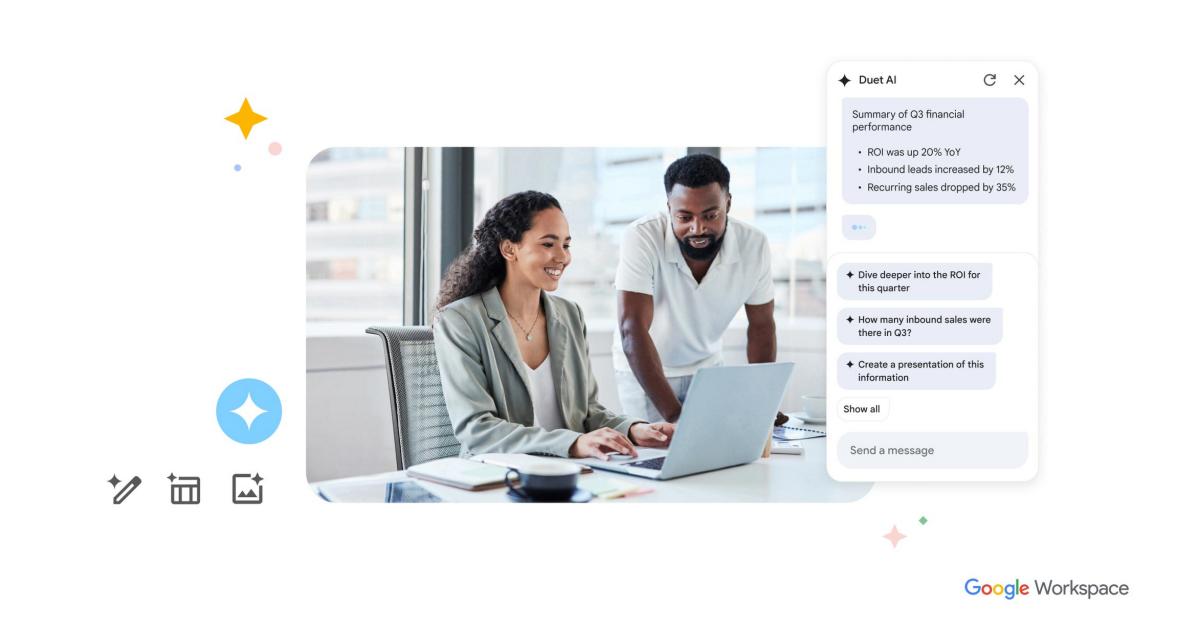Google's Duet AI is coming to Workspace apps, but pro users will need to pay extra - 5 minutes read

Back at I/O, we got a sense of some of Google's big plans for generative artificial intelligence, including the integration of the Duet AI virtual assistant into Workspace productivity apps. The company is now starting to roll out Duet AI to those who pay for versions of Docs, Gmail, Sheets and so on that are geared toward professional use. The virtual assistant is also making its way to Google Meet and Google Chat.
There's a free trial of Duet AI for Google Workspace. However, to use the virtual assistant in the cloud-based apps after that, large organizations will need to pay $30 per month per user, according to The Verge. Microsoft charges the same for 365 AI Copilot in Office apps. Duet AI pricing for smaller organizations hasn't been finalized yet.
Duet AI has a lot of tools in its belt that are designed to lighten your workload. You can use it to generate an entire email draft in Gmail. It can pore over emails and a swathe of documents and spreadsheets to create a summary of recent work activities (such as your company's quarterly performance). The assistant can then build a presentation for you based on its findings — but definitely review the slides to make sure all the facts and figures are accurate before showing them to your bosses. And, of course, Duet AI can generate images as well.
The virtual assistant will be able to help you out on other fronts too, including in Google Meet and Chat. It has somewhat different functions in Meet, since it can help you "look and sound your best with studio look, studio lighting and studio sound," Google Workspace general manager and vice president Aparna Pappu wrote in a blog post. Duet AI can use face detection and dynamic tiles to give everyone in a meeting room their own video tile, perhaps with the idea of making all the participants feel more engaged and connected.
Meet will be able to offer translated captions in 18 languages. Google says the app can tell when someone is speaking in another language and display translated text in real time. (For comparison, Zoom has offered live transcription to free users for nearly two years.)
Duet AI's note-taking functions should prove useful too. A "take notes for me" feature will prompt the assistant to jot down action items and capture video snippets, then send a summary to attendees after the fact. If you're unable to join a meeting right at the beginning (or you slept in, we're not judging), Duet AI can catch you up on what you missed with an in-progress summary.
If you can't make it to a meeting at all, you can send Duet AI on your behalf. The assistant can get your points across to other attendees and still make sure you get a summary afterwards. However, if all participants use Duet AI as their proxy, Meet will seemingly be able to detect that and end the meeting.
On top of all of that, the company is stuffing Duet AI into Google Chat too. Google is trying to make the app more of a competitor to Slack and Microsoft Teams, which could make a lot of sense for organizations that are already paying for Workspace for other productivity apps.
You'll be able to ask Duet AI questions about topics of discussion. The assistant will be able to get you up to speed on conversations you missed and summarize documents that others have shared. Google has refreshed Chat's user interface and added more shortcuts and an enhanced search function that includes suggested queries and autocomplete. Autocorrect could help you avoid typos in your messages too. Chat communities will also eventually be able to include up to 500,000 users, while those who need to talk something out using their voices will be able to hop into a Meet-powered huddle.
As for privacy, Google says that users' interactions with Duet AI will be private to them. "No other user will see your data and Google does not use your data to train our models without your permission," Pappu wrote. "Building on these core commitments, we recently announced new capabilities to help prevent cyber threats, provide safer work with built-in zero trust controls, and better support our customers’ digital sovereignty and compliance needs."
Generative AI tools have had a largely fraught relationship with privacy so far, with some companies reportedly restricting workers' ChatGPT use over concerns that they may accidentally leak proprietary data. Italy also briefly banned the chatbot due to privacy worries. Just this week, ChatGPT owner OpenAI debuted an Enterprise offering. The company says it won't train its AI models on Enterprise subscribers' usage of the service — a similar claim to the one Google just made with Duet AI.
Google will surely see Duet AI as a competitor to ChatGPT and Microsoft Copilot. It's letting third-party companies use the underlying tech for other apps, such as an upcoming GE Appliances app that can generate recipes based on the food in a fridge (it's hard to think of an AI-powered app that would improve my life more than this). Meanwhile, as The Wall Street Journal notes, Google will make its PaLM 2 language learning model more broadly available after only granting select customers access until now.
Google (and Alphabet) CEO Sundar Pichai told the publication that the company will offer Gemini — its direct answer to ChatGPT — to cloud customers when it's ready fro primetime. Google is also scaling up its infrastructure to handle the demands of AI functionality, but Pichai admitted that the company doesn't have a crystal ball in that regard. “It’s tough to fully predict the demand,” he told the Journal. “I think we will be OK, but does it keep me up at night? Yes.”
Source: Engadget
Powered by NewsAPI.org